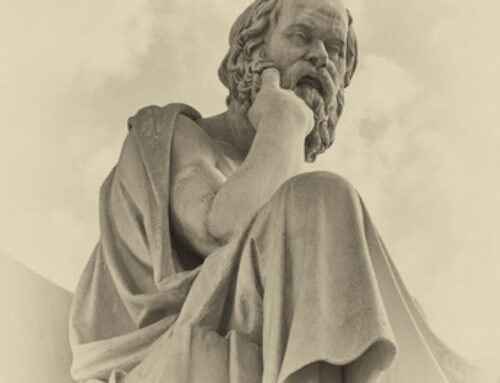 “Truth” has always been one of the most important words in the dictionary. Unfortunately, it is greatly misunderstood today, and the world has been harmed as a result. The best way to begin a discussion of it is to clarify its meaning. Cambridge dictionary defines truth as “the real facts about a situation, event, or person”; Merriam-Webster as “actuality,” “the state of being the case.”
“Truth” has always been one of the most important words in the dictionary. Unfortunately, it is greatly misunderstood today, and the world has been harmed as a result. The best way to begin a discussion of it is to clarify its meaning. Cambridge dictionary defines truth as “the real facts about a situation, event, or person”; Merriam-Webster as “actuality,” “the state of being the case.”
For a more useful definition I recommend this: Truth is what is so; untruth is what is not so. A statement is true when it reflects reality and false when it does not.
An accurate understanding of truth both assures and cautions us. The assurance is that truth exists and can be discovered; the caution is that it must be distinguished from falsehood. With this understanding, across cultures and throughout time, wisdom has always directed us to seek truth and be wary of untruth. Innumerable people have echoed that advice. For example, Confucius, “Three things cannot long be hidden—the sun, the moon, and the truth.” Mahatma Gandhi, “An error does not become truth by reason of multiplied propagation, nor does truth become error because nobody sees it.” Winston Churchill, “The truth is incontrovertible: malice may attack it, ignorance may deride it, but in the end, there it is.”
However, over the last century misunderstanding has arisen and been embraced by many people, including educators and other influential people, who have spread falsity about truth to several generations of individuals around the world. Their message has been that ancient wisdom about truth is not wise at all, but foolish; and that truth is whatever we want it to be and therefore there is no such thing as untruth or falsehood.
Before illustrating the tremendous harm that false view of truth has done in the world, let me paraphrase Mahatma Gandhi’s explanation of the power of our thoughts: Our thoughts can become words; our words can become actions; our actions can become habits; our habits can become values; our values can become our destinies. This sequence does not occur with every thought, of course, but just with those that we encounter frequently and repeat to ourselves again and again.
When the ideas occurring in this way are true, the sequence affects us for the better; when they are false, for the worse. And when the idea is about truth itself, the effect is more profound and far-reaching. A false idea of truth has the power to corrupt every other idea we have. When that happens, the false idea leads to mistaken words, bad habits, false values, and sad destinies! Moreover, as the error spreads among individuals, entire cultures can be similarly affected.
That is exactly what has happened and is continuing in America. And as if that were not bad enough, another factor has made false ideas about truth even more difficult to overcome.
For several decades American culture taught us to regard feeling as more reliable than thought, and thus encouraged substituting emotion for reason. For those so trained, Gandhi’s idea sequence is this: Their FEELINGS become words . . . actions; . . . habits . . . values . . ., and because feelings are seldom closely examined, both they and the ideas that flow from them are more firmly held and defended.
The entire process discussed so far can be summarized as follows: Our culture decided that truth is not the same for all people, but instead is created by each individual according to his/her preference. It also decided that the way to create our personal truth is not by reasoned analysis but by following our feelings. This change in our culture’s view of truth explains why false ideas like the following ones are now widely accepted as true:
It is wise to respect even young children’s individuality by letting them decide what behaviors are acceptable for them.
We all have rights, but responsibilities should not be considered binding on anyone unless he or she agrees to them.
Everyone must decide what is moral and what is not. Those decisions are their personal truths, so it is unjust to punish them for following those truths.
Everyone deserves a second chance, even in the case of heinous crimes, so first offenses should never result in a prison sentence.
More arrests are made in black neighborhoods than in white neighborhoods, which proves the police discriminate against African Americans.
Store owners resent looting, but when they overcharge for their goods, looting is justified.
The Constitution was written exclusively by men, so it is unjust to make women live by its mandates.
The earth belongs to all human beings, so no country has the right to close its borders to outsiders seeking to migrate there.
There is nothing unfair about forcing citizens of a nation to take financial responsibility for millions of illegal aliens without consulting those citizens.
Professors should not be limited to teaching only their assigned course material but be free to teach whatever they want their students to know. For example, a math professor should be free to teach politics, climate change, or sexual behavior in his class.
Teachers should have the right to assist grade school students in pursuing sex change procedures without informing their parents.
It is in students’ best interest at all levels of education to be told what to think rather than be taught how to think.
It is to the benefit of society to have journalists present as news only what supports their personal views.
Authors of history books do their readers a service by purging information about people and events whose views opposed the views that prevail today.
When colleges invite speakers with views some students oppose, those students are justified in shouting the speakers down and intimidating them.
The number of ideas like these seems to grow larger every day. The question is how soon Americans will realize that by abandoning the ancient view of truth we have destroyed rationality and common sense and are well on the way to destroying our country.
Copyright © 2024 by Vincent Ryan Ruggiero. All rights reserved


